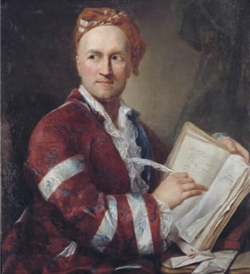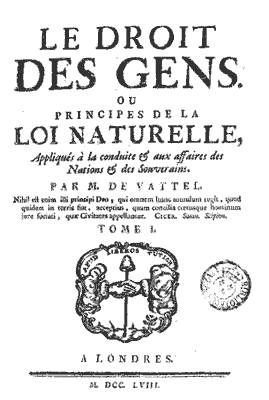<Back to Index>
- Philosopher and International Law Pioneer Emerich de Vattel, 1714
- Painter Gustave Clarence Rodolphe Boulanger, 1824
- King of England Edward II (of Caernarfon), 1284
PAGE SPONSOR


Emer (Emerich or Emmerich) de Vattel (25 April 1714 – 28 December 1767) was a Swiss philosopher, diplomat, and legal expert whose theories laid the foundation of modern international law and political philosophy.
He was born in Couvet in Neuchatel, Switzerland, in 1714 and died in 1767 of edema. He was largely influenced in his philosophy by Gottfried Leibniz and Christian Wolff and strove to integrate their ideas into the legal and political system. He is most famous for his 1758 work Droit des gens; ou, Principes de la loi naturelle appliqués à la conduite et aux affaires des nations et des souverains (in English, The Law of Nations or the Principles of Natural Law Applied to the Conduct and to the Affairs of Nations and of Sovereigns). This work was his claim to fame and won him enough prestige to be appointed as a councilor to the court of King Augustus III of Saxony.
Vattel's masterpiece was largely influenced by a book titled Jus Gentium Methodo Scientifica Pertractum (The Law of Nations According to the Scientific Method) by Christian Wolff. Vattel's work began, in fact, by translating Wolff's text from Latin, and adding his own thoughts. Vattel's work was also heavily influenced by Gottfried Leibniz and Hugo Grotius. Focused largely on the rights and obligations of citizens and states, Vattel's work also had ramifications for Just War Theory as it outlined international diplomacy as we now know it.
Vattel elucidated the "Golden Rule of Sovereigns":
One cannot complain when he is treated as he treats others.
Vattel’s Law of Nations was translated into English in 1760, based on the French original of 1758. A Dublin translation of 1787 does not include notes from the original nor posthumous notes added to the 1773 French edition. Several other English editions were based on the edition of 1760. However, an English edition from 1793 includes Vattel’s later thoughts, as did the London 1797 edition. The 1797 edition has a detailed table of contents and margin titles for subsections.
Swiss editor Charles W.F. Dumas sent Benjamin Franklin three original French copies of de Vattel's Le droit des gens (The Law of Nations). Franklin presented one copy to the Library Company of Philadelphia. On December 9, 1775, Franklin thanked Dumas:
It came to us in good season, when the circumstances of a rising State make it necessary to frequently consult the Law of Nations.
Franklin also said that this book by Vattel, "has been continually in the hands of the members of our Congress now sitting".
Two notable copies of
The Law of Nations
owned by the
New York Society Library have been associated with US President George Washington. One copy had been borrowed by Washington on 8 October 1789, along with a copy of Vol. 12 of the Commons Debates, containing transcripts from Great Britain's House of Commons. When the staff of the Washington museum at Mount Vernon heard about the overdue books, they were unable to locate them, but purchased a second copy of the de Vattel work for US$ 12,000. This identical copy was ceremoniously "returned" 221 years late on 20 May 2010. The library waived the unpaid late fees.
Vattel was one of a number of 18th century European scholars who wrote on international law and were "well known in America" at the time, including Jean - Jacques Burlamaqui, Cornelius van Bynkershoek, Hugo Grotius, Samuel von Pufendorf, Thomas Rutherforth, and Wolff. The Law of Nations has been described as "unrivaled among such treatises in its influence on the American founders".